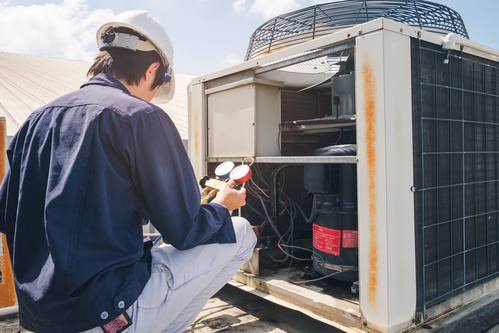Homeowners often ask the questions such as whether dirty air filters in their HVAC system notch up their utility costs and how often the filters need to get changed. Read on for this article is meant as a short guide on these issues.
First of all, yes, dirty filters do increase your utility costs. When your filters get dirty, the air flow into the system is restricted. This means that your heating or cooling machine will need to work harder to maintain sufficient air flow and keep the indoors warm or cold, according to the season. Now, since your unit is working harder, it is also consuming more energy and this directly translates into higher utility costs.
However, dirty filters can do more harm than this. With dirty filters, the quality of the air inside will fall and this can create health hazards for the family members. Unclean or clogged filters may also cause your unit to break down—which will mean costly repairs. Finally, not changing your filters regularly will also bring down the lifespan of your unit.
You must also keep it in mind that changing air filters are not part of your annual HVAC maintenance. In fact, most standard filters used for home units will need to be replaced every three months. Some may even require replacement once every month.
There are also other circumstantial factors which will determine the change-out frequency rate of your air filter. Understandably, if you live in a place which enjoys pleasant weather across majority of the seasons, your HVAC units will require much less operation. In such cases, the filters will enjoy a longer life span. Similarly, if the unit is made to run more regularly, the lifespan of the filters will come down.
Other factors involve average traffic at your home, tobacco smoke, pet hair, etc. All of these will serve to wear out the filters sooner than is standard. In case you are not sure if your filters need a replacement, you can contact a HVAC professional and let him inspect your system. After the inspection of your unit and your home environment, he will be able to tell you how frequently you need to change your HVAC air filters.
For more articles on the subject and other useful information on how to keep your heating and cooling systems running efficiently, follow us here on this blog.
Frequently Asked Questions
1. Do dirty HVAC filters increase utility costs?
Yes, dirty air filters can cause a significant rise in utility costs. When filters become clogged, they restrict airflow, making your HVAC system work harder to maintain comfortable indoor temperatures. The added strain increases energy consumption, directly leading to higher utility bills.
2. How often should I change my HVAC air filter?
Most standard home HVAC filters should be replaced every 1-3 months. Filters in homes with pets, smokers, or heavy foot traffic may need more frequent changes. For best results, check your filter monthly and replace it as needed to ensure optimal system performance.
3. Can dirty air filters affect indoor air quality?
Yes, clogged filters reduce the quality of the air circulating in your home. Dust, pollen, and other contaminants that are normally filtered out can build up, leading to poor indoor air quality, which can contribute to health issues like allergies and respiratory problems.
4. Can a dirty filter damage my HVAC system?
Over time, dirty filters can cause your HVAC system to overwork, increasing the chances of a breakdown. The restricted airflow puts a strain on the equipment, which may lead to costly repairs or even shorten the system’s lifespan. Replacing filters regularly helps avoid this.
5. Does changing air filters come with annual HVAC maintenance?
No, replacing air filters is not typically included in annual HVAC maintenance. Homeowners are responsible for checking and replacing filters every 1-3 months. Regular maintenance focuses on other aspects of your system, like inspecting and cleaning coils and checking refrigerant levels.
6. What factors determine how often I should change my HVAC filter?
Several factors can influence how often filters need replacing, including how often the HVAC system runs, the climate in your area, the number of people and pets in your home, and the presence of smoke or dust. Homes in mild climates may need less frequent filter changes, while heavy HVAC use or pet hair may require monthly changes.
7. How do I know if my filter needs replacing?
A visual inspection can often tell you if your filter is dirty. If the filter looks clogged with dust and debris, it’s time to change it. If you’re unsure, consider having a professional HVAC technician inspect your system and provide advice on how frequently your filters need replacing based on your specific home environment.
8. What are the consequences of not changing the HVAC filter regularly?
Failure to replace the filter regularly can lead to poor airflow, higher utility costs, decreased indoor air quality, and potential damage to your HVAC system. This can result in costly repairs or even the need for a full system replacement over time.
9. Can pets affect how often I need to change my filter?
Yes, pet hair and dander can accumulate quickly in HVAC filters, reducing their effectiveness. Homes with pets, especially those that shed frequently, may require monthly filter changes to maintain good airflow and air quality.
10. Where can I find more information on maintaining my HVAC system?
For more tips and useful information on keeping your HVAC system running efficiently, follow our blog. We regularly provide updates on HVAC maintenance, energy-saving tips, and how to extend the life of your system.



